An Analysis of Primary School's Contribution to Student's Identity
VerifiedAdded on 2023/04/17
|8
|1727
|367
Essay
AI Summary
This essay explores the significant role primary schools play in shaping a student's identity. It discusses how children begin developing their sense of self through interactions, play, and the values instilled in them during their primary school years. The essay delves into the concept of socialization, particularly primary socialization, and how schools contribute to this process by imparting cultural norms and knowledge. It further analyzes the discourses of age, gender, and sexuality within the primary school setting, highlighting how these discourses influence children's perceptions of themselves and the world around them. The essay argues that language and classroom interactions profoundly impact children's self-identity, shaping their understanding of age-appropriate behavior, gender roles, and sexuality, and concludes that primary schools are instrumental in the construction of a student's identity through various forms of discourse.
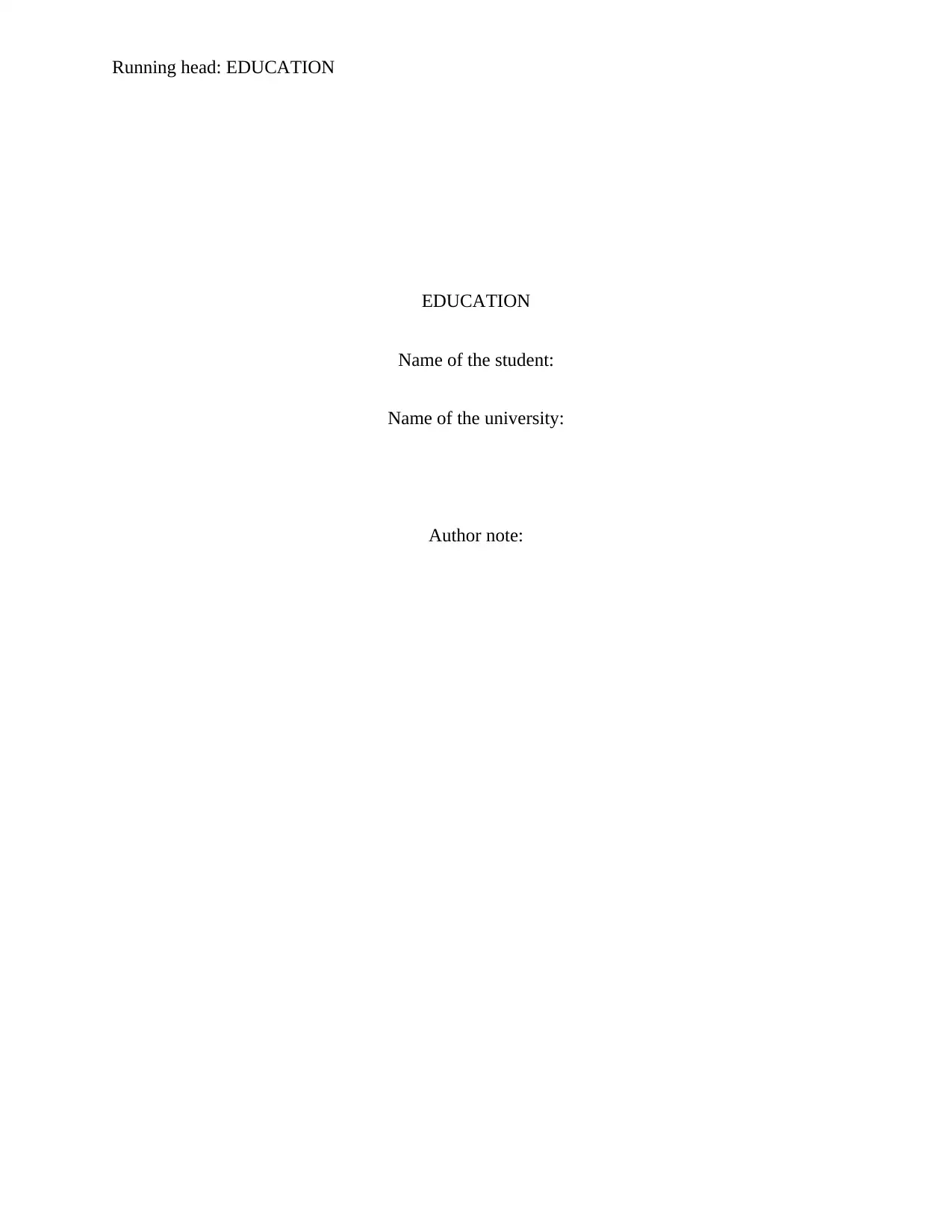
Running head: EDUCATION
EDUCATION
Name of the student:
Name of the university:
Author note:
EDUCATION
Name of the student:
Name of the university:
Author note:
Paraphrase This Document
Need a fresh take? Get an instant paraphrase of this document with our AI Paraphraser
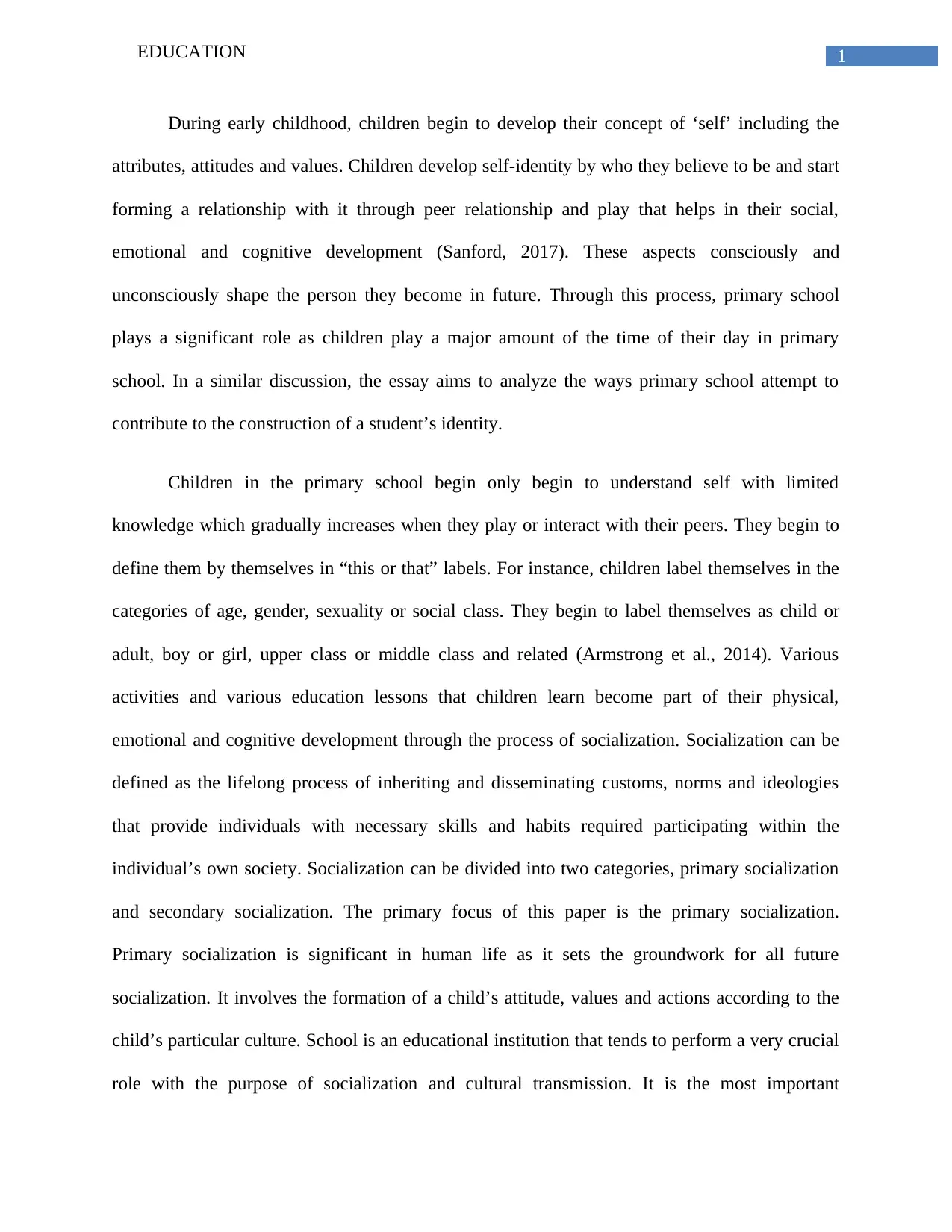
1EDUCATION
During early childhood, children begin to develop their concept of ‘self’ including the
attributes, attitudes and values. Children develop self-identity by who they believe to be and start
forming a relationship with it through peer relationship and play that helps in their social,
emotional and cognitive development (Sanford, 2017). These aspects consciously and
unconsciously shape the person they become in future. Through this process, primary school
plays a significant role as children play a major amount of the time of their day in primary
school. In a similar discussion, the essay aims to analyze the ways primary school attempt to
contribute to the construction of a student’s identity.
Children in the primary school begin only begin to understand self with limited
knowledge which gradually increases when they play or interact with their peers. They begin to
define them by themselves in “this or that” labels. For instance, children label themselves in the
categories of age, gender, sexuality or social class. They begin to label themselves as child or
adult, boy or girl, upper class or middle class and related (Armstrong et al., 2014). Various
activities and various education lessons that children learn become part of their physical,
emotional and cognitive development through the process of socialization. Socialization can be
defined as the lifelong process of inheriting and disseminating customs, norms and ideologies
that provide individuals with necessary skills and habits required participating within the
individual’s own society. Socialization can be divided into two categories, primary socialization
and secondary socialization. The primary focus of this paper is the primary socialization.
Primary socialization is significant in human life as it sets the groundwork for all future
socialization. It involves the formation of a child’s attitude, values and actions according to the
child’s particular culture. School is an educational institution that tends to perform a very crucial
role with the purpose of socialization and cultural transmission. It is the most important
During early childhood, children begin to develop their concept of ‘self’ including the
attributes, attitudes and values. Children develop self-identity by who they believe to be and start
forming a relationship with it through peer relationship and play that helps in their social,
emotional and cognitive development (Sanford, 2017). These aspects consciously and
unconsciously shape the person they become in future. Through this process, primary school
plays a significant role as children play a major amount of the time of their day in primary
school. In a similar discussion, the essay aims to analyze the ways primary school attempt to
contribute to the construction of a student’s identity.
Children in the primary school begin only begin to understand self with limited
knowledge which gradually increases when they play or interact with their peers. They begin to
define them by themselves in “this or that” labels. For instance, children label themselves in the
categories of age, gender, sexuality or social class. They begin to label themselves as child or
adult, boy or girl, upper class or middle class and related (Armstrong et al., 2014). Various
activities and various education lessons that children learn become part of their physical,
emotional and cognitive development through the process of socialization. Socialization can be
defined as the lifelong process of inheriting and disseminating customs, norms and ideologies
that provide individuals with necessary skills and habits required participating within the
individual’s own society. Socialization can be divided into two categories, primary socialization
and secondary socialization. The primary focus of this paper is the primary socialization.
Primary socialization is significant in human life as it sets the groundwork for all future
socialization. It involves the formation of a child’s attitude, values and actions according to the
child’s particular culture. School is an educational institution that tends to perform a very crucial
role with the purpose of socialization and cultural transmission. It is the most important
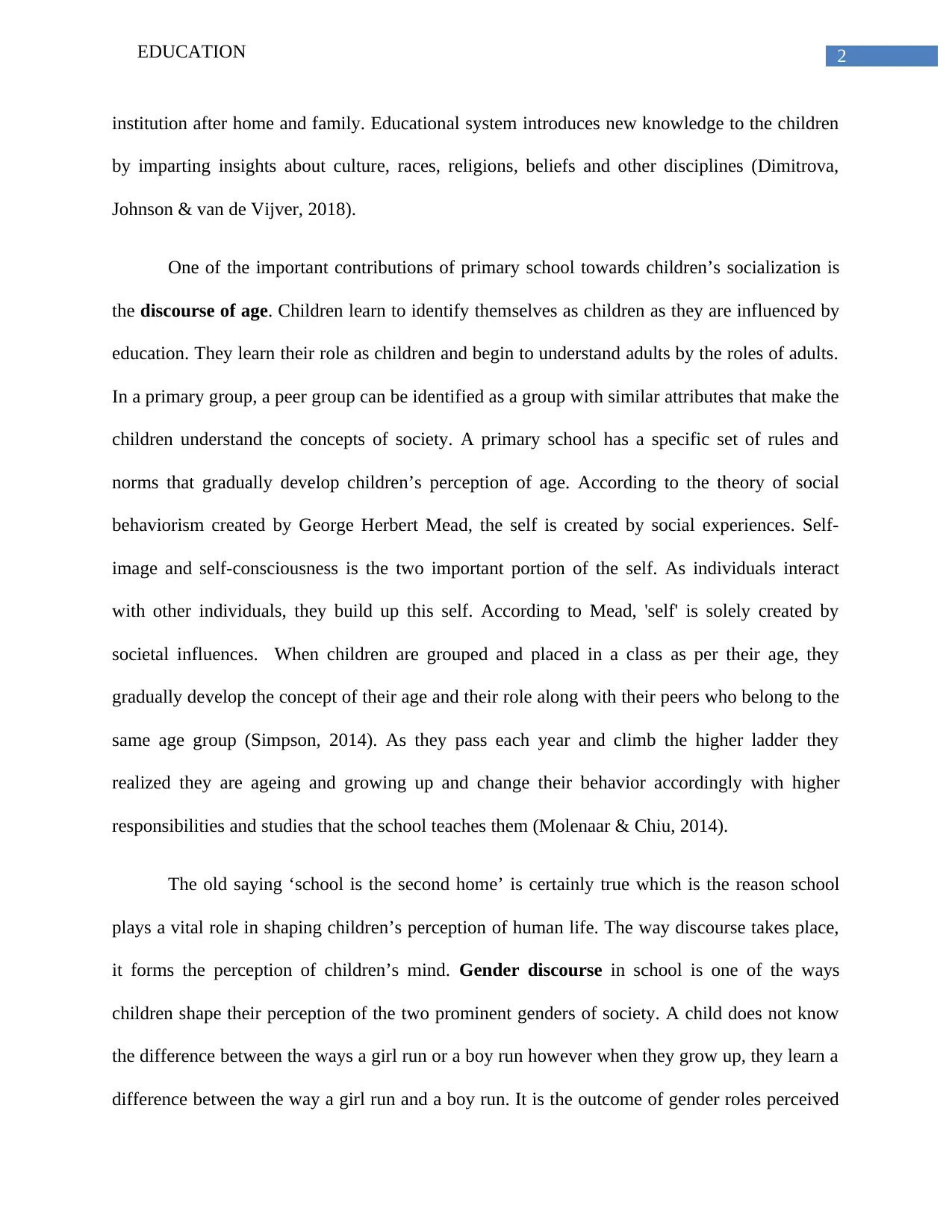
2EDUCATION
institution after home and family. Educational system introduces new knowledge to the children
by imparting insights about culture, races, religions, beliefs and other disciplines (Dimitrova,
Johnson & van de Vijver, 2018).
One of the important contributions of primary school towards children’s socialization is
the discourse of age. Children learn to identify themselves as children as they are influenced by
education. They learn their role as children and begin to understand adults by the roles of adults.
In a primary group, a peer group can be identified as a group with similar attributes that make the
children understand the concepts of society. A primary school has a specific set of rules and
norms that gradually develop children’s perception of age. According to the theory of social
behaviorism created by George Herbert Mead, the self is created by social experiences. Self-
image and self-consciousness is the two important portion of the self. As individuals interact
with other individuals, they build up this self. According to Mead, 'self' is solely created by
societal influences. When children are grouped and placed in a class as per their age, they
gradually develop the concept of their age and their role along with their peers who belong to the
same age group (Simpson, 2014). As they pass each year and climb the higher ladder they
realized they are ageing and growing up and change their behavior accordingly with higher
responsibilities and studies that the school teaches them (Molenaar & Chiu, 2014).
The old saying ‘school is the second home’ is certainly true which is the reason school
plays a vital role in shaping children’s perception of human life. The way discourse takes place,
it forms the perception of children’s mind. Gender discourse in school is one of the ways
children shape their perception of the two prominent genders of society. A child does not know
the difference between the ways a girl run or a boy run however when they grow up, they learn a
difference between the way a girl run and a boy run. It is the outcome of gender roles perceived
institution after home and family. Educational system introduces new knowledge to the children
by imparting insights about culture, races, religions, beliefs and other disciplines (Dimitrova,
Johnson & van de Vijver, 2018).
One of the important contributions of primary school towards children’s socialization is
the discourse of age. Children learn to identify themselves as children as they are influenced by
education. They learn their role as children and begin to understand adults by the roles of adults.
In a primary group, a peer group can be identified as a group with similar attributes that make the
children understand the concepts of society. A primary school has a specific set of rules and
norms that gradually develop children’s perception of age. According to the theory of social
behaviorism created by George Herbert Mead, the self is created by social experiences. Self-
image and self-consciousness is the two important portion of the self. As individuals interact
with other individuals, they build up this self. According to Mead, 'self' is solely created by
societal influences. When children are grouped and placed in a class as per their age, they
gradually develop the concept of their age and their role along with their peers who belong to the
same age group (Simpson, 2014). As they pass each year and climb the higher ladder they
realized they are ageing and growing up and change their behavior accordingly with higher
responsibilities and studies that the school teaches them (Molenaar & Chiu, 2014).
The old saying ‘school is the second home’ is certainly true which is the reason school
plays a vital role in shaping children’s perception of human life. The way discourse takes place,
it forms the perception of children’s mind. Gender discourse in school is one of the ways
children shape their perception of the two prominent genders of society. A child does not know
the difference between the ways a girl run or a boy run however when they grow up, they learn a
difference between the way a girl run and a boy run. It is the outcome of gender roles perceived
⊘ This is a preview!⊘
Do you want full access?
Subscribe today to unlock all pages.

Trusted by 1+ million students worldwide
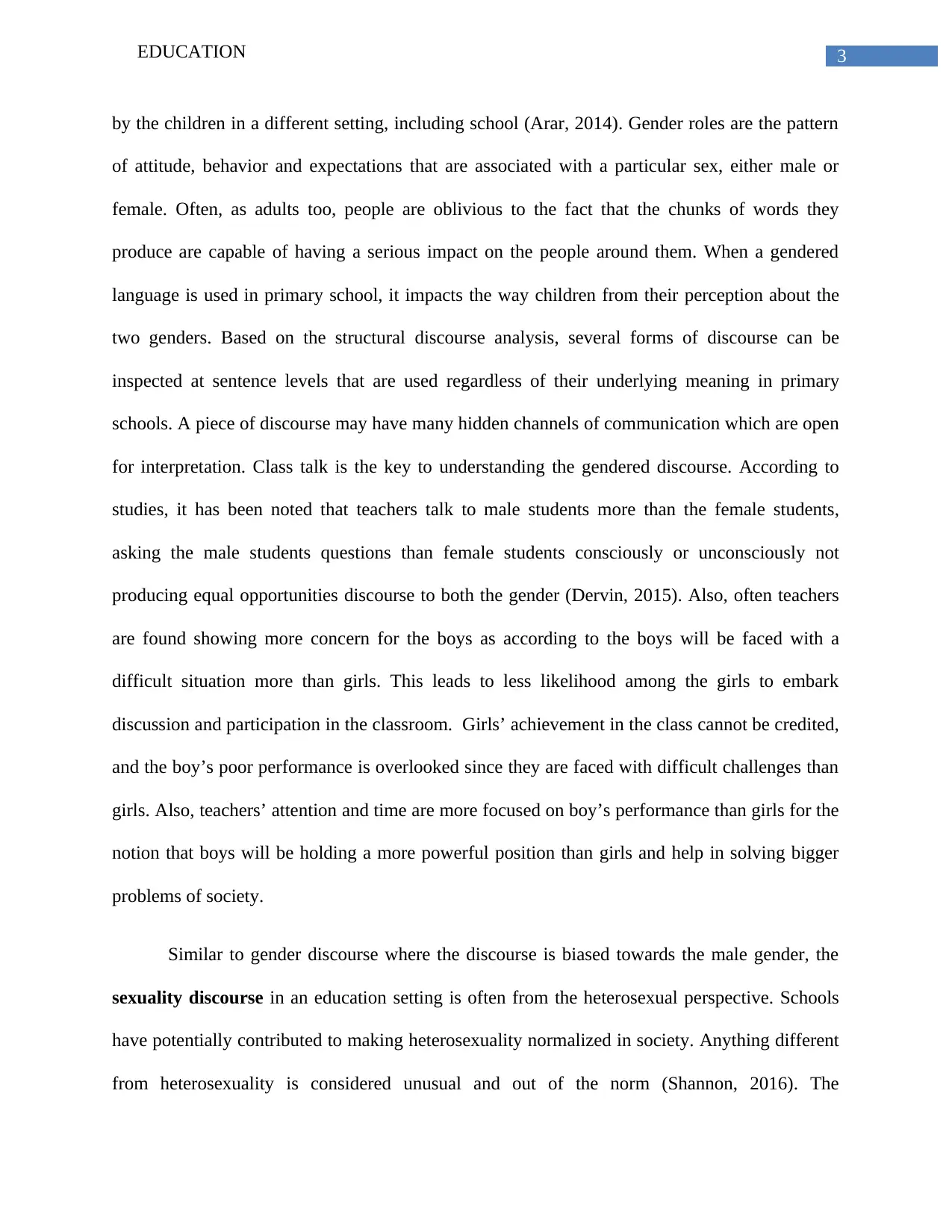
3EDUCATION
by the children in a different setting, including school (Arar, 2014). Gender roles are the pattern
of attitude, behavior and expectations that are associated with a particular sex, either male or
female. Often, as adults too, people are oblivious to the fact that the chunks of words they
produce are capable of having a serious impact on the people around them. When a gendered
language is used in primary school, it impacts the way children from their perception about the
two genders. Based on the structural discourse analysis, several forms of discourse can be
inspected at sentence levels that are used regardless of their underlying meaning in primary
schools. A piece of discourse may have many hidden channels of communication which are open
for interpretation. Class talk is the key to understanding the gendered discourse. According to
studies, it has been noted that teachers talk to male students more than the female students,
asking the male students questions than female students consciously or unconsciously not
producing equal opportunities discourse to both the gender (Dervin, 2015). Also, often teachers
are found showing more concern for the boys as according to the boys will be faced with a
difficult situation more than girls. This leads to less likelihood among the girls to embark
discussion and participation in the classroom. Girls’ achievement in the class cannot be credited,
and the boy’s poor performance is overlooked since they are faced with difficult challenges than
girls. Also, teachers’ attention and time are more focused on boy’s performance than girls for the
notion that boys will be holding a more powerful position than girls and help in solving bigger
problems of society.
Similar to gender discourse where the discourse is biased towards the male gender, the
sexuality discourse in an education setting is often from the heterosexual perspective. Schools
have potentially contributed to making heterosexuality normalized in society. Anything different
from heterosexuality is considered unusual and out of the norm (Shannon, 2016). The
by the children in a different setting, including school (Arar, 2014). Gender roles are the pattern
of attitude, behavior and expectations that are associated with a particular sex, either male or
female. Often, as adults too, people are oblivious to the fact that the chunks of words they
produce are capable of having a serious impact on the people around them. When a gendered
language is used in primary school, it impacts the way children from their perception about the
two genders. Based on the structural discourse analysis, several forms of discourse can be
inspected at sentence levels that are used regardless of their underlying meaning in primary
schools. A piece of discourse may have many hidden channels of communication which are open
for interpretation. Class talk is the key to understanding the gendered discourse. According to
studies, it has been noted that teachers talk to male students more than the female students,
asking the male students questions than female students consciously or unconsciously not
producing equal opportunities discourse to both the gender (Dervin, 2015). Also, often teachers
are found showing more concern for the boys as according to the boys will be faced with a
difficult situation more than girls. This leads to less likelihood among the girls to embark
discussion and participation in the classroom. Girls’ achievement in the class cannot be credited,
and the boy’s poor performance is overlooked since they are faced with difficult challenges than
girls. Also, teachers’ attention and time are more focused on boy’s performance than girls for the
notion that boys will be holding a more powerful position than girls and help in solving bigger
problems of society.
Similar to gender discourse where the discourse is biased towards the male gender, the
sexuality discourse in an education setting is often from the heterosexual perspective. Schools
have potentially contributed to making heterosexuality normalized in society. Anything different
from heterosexuality is considered unusual and out of the norm (Shannon, 2016). The
Paraphrase This Document
Need a fresh take? Get an instant paraphrase of this document with our AI Paraphraser
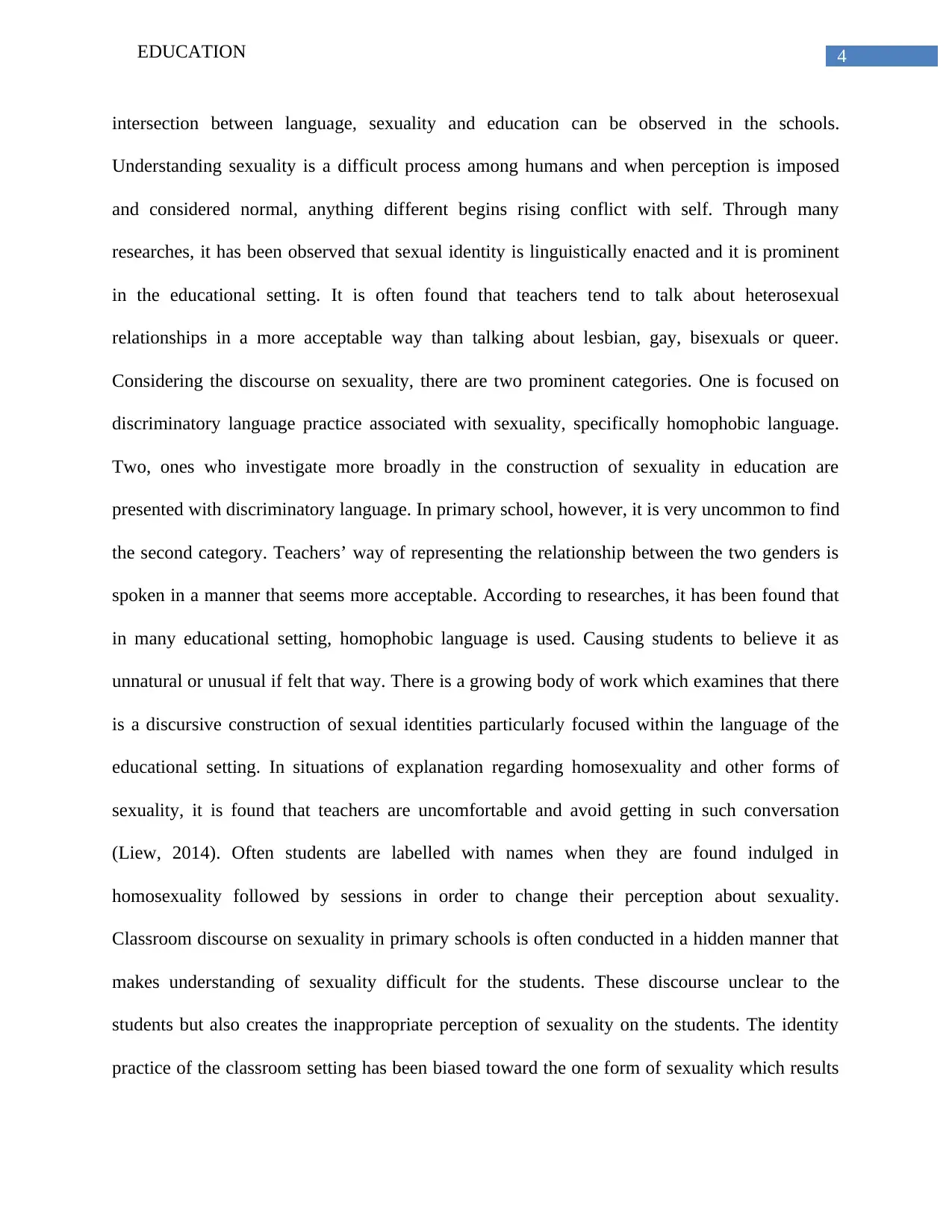
4EDUCATION
intersection between language, sexuality and education can be observed in the schools.
Understanding sexuality is a difficult process among humans and when perception is imposed
and considered normal, anything different begins rising conflict with self. Through many
researches, it has been observed that sexual identity is linguistically enacted and it is prominent
in the educational setting. It is often found that teachers tend to talk about heterosexual
relationships in a more acceptable way than talking about lesbian, gay, bisexuals or queer.
Considering the discourse on sexuality, there are two prominent categories. One is focused on
discriminatory language practice associated with sexuality, specifically homophobic language.
Two, ones who investigate more broadly in the construction of sexuality in education are
presented with discriminatory language. In primary school, however, it is very uncommon to find
the second category. Teachers’ way of representing the relationship between the two genders is
spoken in a manner that seems more acceptable. According to researches, it has been found that
in many educational setting, homophobic language is used. Causing students to believe it as
unnatural or unusual if felt that way. There is a growing body of work which examines that there
is a discursive construction of sexual identities particularly focused within the language of the
educational setting. In situations of explanation regarding homosexuality and other forms of
sexuality, it is found that teachers are uncomfortable and avoid getting in such conversation
(Liew, 2014). Often students are labelled with names when they are found indulged in
homosexuality followed by sessions in order to change their perception about sexuality.
Classroom discourse on sexuality in primary schools is often conducted in a hidden manner that
makes understanding of sexuality difficult for the students. These discourse unclear to the
students but also creates the inappropriate perception of sexuality on the students. The identity
practice of the classroom setting has been biased toward the one form of sexuality which results
intersection between language, sexuality and education can be observed in the schools.
Understanding sexuality is a difficult process among humans and when perception is imposed
and considered normal, anything different begins rising conflict with self. Through many
researches, it has been observed that sexual identity is linguistically enacted and it is prominent
in the educational setting. It is often found that teachers tend to talk about heterosexual
relationships in a more acceptable way than talking about lesbian, gay, bisexuals or queer.
Considering the discourse on sexuality, there are two prominent categories. One is focused on
discriminatory language practice associated with sexuality, specifically homophobic language.
Two, ones who investigate more broadly in the construction of sexuality in education are
presented with discriminatory language. In primary school, however, it is very uncommon to find
the second category. Teachers’ way of representing the relationship between the two genders is
spoken in a manner that seems more acceptable. According to researches, it has been found that
in many educational setting, homophobic language is used. Causing students to believe it as
unnatural or unusual if felt that way. There is a growing body of work which examines that there
is a discursive construction of sexual identities particularly focused within the language of the
educational setting. In situations of explanation regarding homosexuality and other forms of
sexuality, it is found that teachers are uncomfortable and avoid getting in such conversation
(Liew, 2014). Often students are labelled with names when they are found indulged in
homosexuality followed by sessions in order to change their perception about sexuality.
Classroom discourse on sexuality in primary schools is often conducted in a hidden manner that
makes understanding of sexuality difficult for the students. These discourse unclear to the
students but also creates the inappropriate perception of sexuality on the students. The identity
practice of the classroom setting has been biased toward the one form of sexuality which results
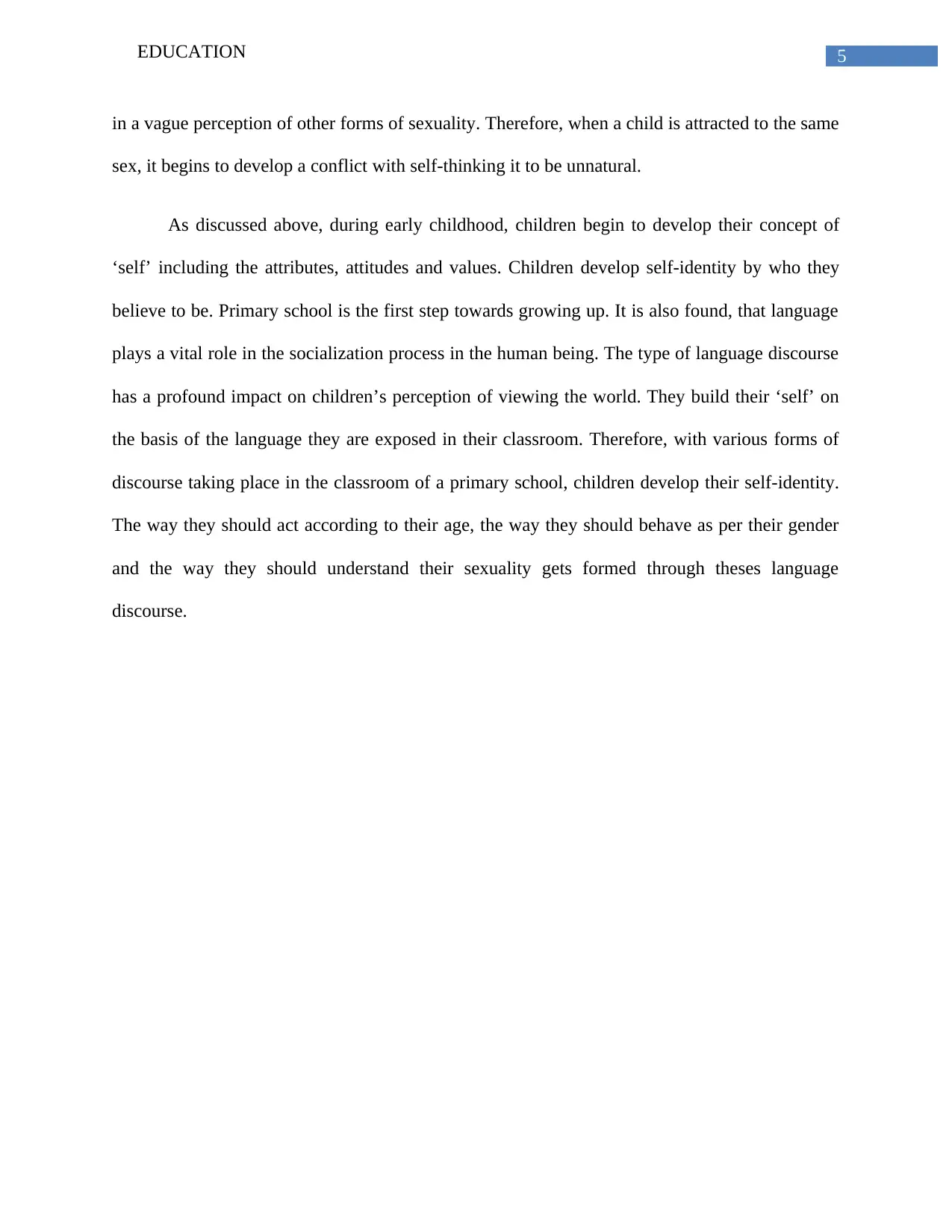
5EDUCATION
in a vague perception of other forms of sexuality. Therefore, when a child is attracted to the same
sex, it begins to develop a conflict with self-thinking it to be unnatural.
As discussed above, during early childhood, children begin to develop their concept of
‘self’ including the attributes, attitudes and values. Children develop self-identity by who they
believe to be. Primary school is the first step towards growing up. It is also found, that language
plays a vital role in the socialization process in the human being. The type of language discourse
has a profound impact on children’s perception of viewing the world. They build their ‘self’ on
the basis of the language they are exposed in their classroom. Therefore, with various forms of
discourse taking place in the classroom of a primary school, children develop their self-identity.
The way they should act according to their age, the way they should behave as per their gender
and the way they should understand their sexuality gets formed through theses language
discourse.
in a vague perception of other forms of sexuality. Therefore, when a child is attracted to the same
sex, it begins to develop a conflict with self-thinking it to be unnatural.
As discussed above, during early childhood, children begin to develop their concept of
‘self’ including the attributes, attitudes and values. Children develop self-identity by who they
believe to be. Primary school is the first step towards growing up. It is also found, that language
plays a vital role in the socialization process in the human being. The type of language discourse
has a profound impact on children’s perception of viewing the world. They build their ‘self’ on
the basis of the language they are exposed in their classroom. Therefore, with various forms of
discourse taking place in the classroom of a primary school, children develop their self-identity.
The way they should act according to their age, the way they should behave as per their gender
and the way they should understand their sexuality gets formed through theses language
discourse.
⊘ This is a preview!⊘
Do you want full access?
Subscribe today to unlock all pages.

Trusted by 1+ million students worldwide
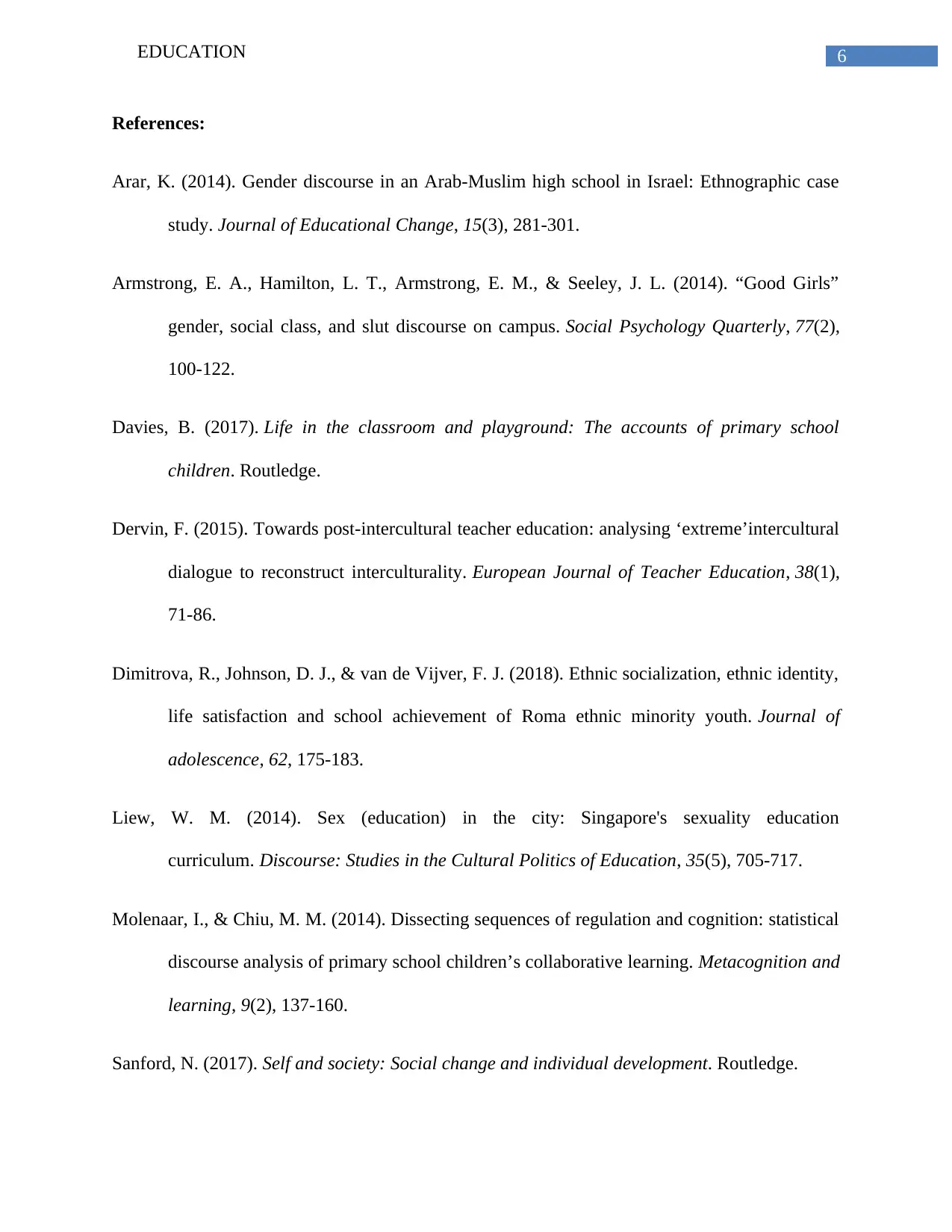
6EDUCATION
References:
Arar, K. (2014). Gender discourse in an Arab-Muslim high school in Israel: Ethnographic case
study. Journal of Educational Change, 15(3), 281-301.
Armstrong, E. A., Hamilton, L. T., Armstrong, E. M., & Seeley, J. L. (2014). “Good Girls”
gender, social class, and slut discourse on campus. Social Psychology Quarterly, 77(2),
100-122.
Davies, B. (2017). Life in the classroom and playground: The accounts of primary school
children. Routledge.
Dervin, F. (2015). Towards post-intercultural teacher education: analysing ‘extreme’intercultural
dialogue to reconstruct interculturality. European Journal of Teacher Education, 38(1),
71-86.
Dimitrova, R., Johnson, D. J., & van de Vijver, F. J. (2018). Ethnic socialization, ethnic identity,
life satisfaction and school achievement of Roma ethnic minority youth. Journal of
adolescence, 62, 175-183.
Liew, W. M. (2014). Sex (education) in the city: Singapore's sexuality education
curriculum. Discourse: Studies in the Cultural Politics of Education, 35(5), 705-717.
Molenaar, I., & Chiu, M. M. (2014). Dissecting sequences of regulation and cognition: statistical
discourse analysis of primary school children’s collaborative learning. Metacognition and
learning, 9(2), 137-160.
Sanford, N. (2017). Self and society: Social change and individual development. Routledge.
References:
Arar, K. (2014). Gender discourse in an Arab-Muslim high school in Israel: Ethnographic case
study. Journal of Educational Change, 15(3), 281-301.
Armstrong, E. A., Hamilton, L. T., Armstrong, E. M., & Seeley, J. L. (2014). “Good Girls”
gender, social class, and slut discourse on campus. Social Psychology Quarterly, 77(2),
100-122.
Davies, B. (2017). Life in the classroom and playground: The accounts of primary school
children. Routledge.
Dervin, F. (2015). Towards post-intercultural teacher education: analysing ‘extreme’intercultural
dialogue to reconstruct interculturality. European Journal of Teacher Education, 38(1),
71-86.
Dimitrova, R., Johnson, D. J., & van de Vijver, F. J. (2018). Ethnic socialization, ethnic identity,
life satisfaction and school achievement of Roma ethnic minority youth. Journal of
adolescence, 62, 175-183.
Liew, W. M. (2014). Sex (education) in the city: Singapore's sexuality education
curriculum. Discourse: Studies in the Cultural Politics of Education, 35(5), 705-717.
Molenaar, I., & Chiu, M. M. (2014). Dissecting sequences of regulation and cognition: statistical
discourse analysis of primary school children’s collaborative learning. Metacognition and
learning, 9(2), 137-160.
Sanford, N. (2017). Self and society: Social change and individual development. Routledge.
Paraphrase This Document
Need a fresh take? Get an instant paraphrase of this document with our AI Paraphraser
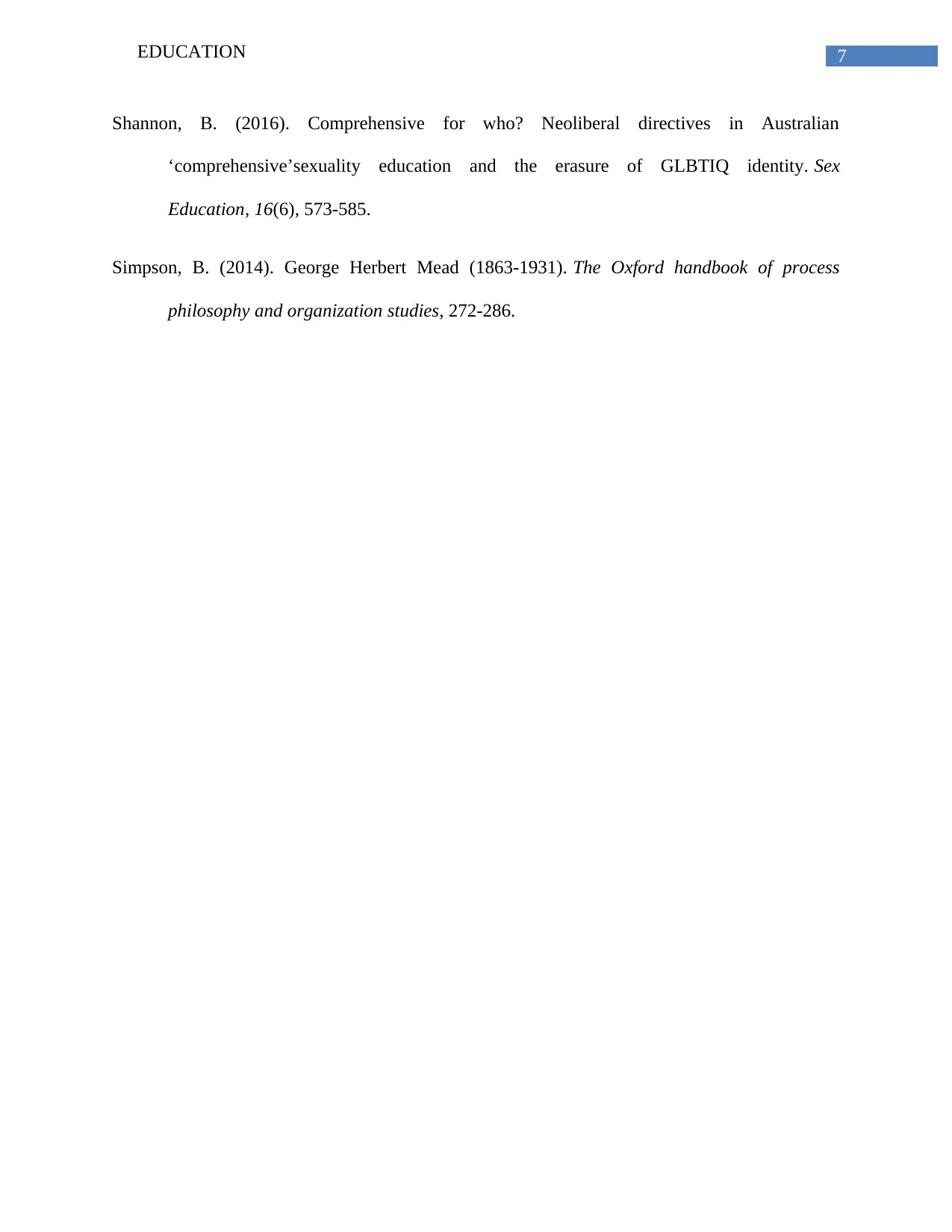
7EDUCATION
Shannon, B. (2016). Comprehensive for who? Neoliberal directives in Australian
‘comprehensive’sexuality education and the erasure of GLBTIQ identity. Sex
Education, 16(6), 573-585.
Simpson, B. (2014). George Herbert Mead (1863-1931). The Oxford handbook of process
philosophy and organization studies, 272-286.
Shannon, B. (2016). Comprehensive for who? Neoliberal directives in Australian
‘comprehensive’sexuality education and the erasure of GLBTIQ identity. Sex
Education, 16(6), 573-585.
Simpson, B. (2014). George Herbert Mead (1863-1931). The Oxford handbook of process
philosophy and organization studies, 272-286.
1 out of 8
Related Documents
Your All-in-One AI-Powered Toolkit for Academic Success.
+13062052269
info@desklib.com
Available 24*7 on WhatsApp / Email
![[object Object]](/_next/static/media/star-bottom.7253800d.svg)
Unlock your academic potential
Copyright © 2020–2026 A2Z Services. All Rights Reserved. Developed and managed by ZUCOL.




